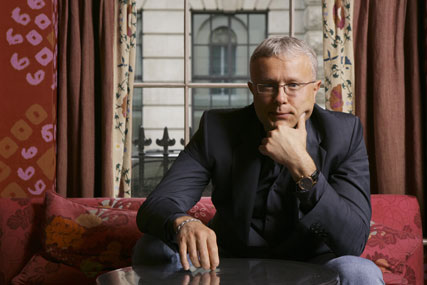Read one of the few interviews Russian billionaire Alexander Lebedev has granted to the press and it becomes obvious he is a man who revels in being something of an enigma.
, a sneaker-clad Lebedev maintained the same tone and expression on subjects as diverse as Margaret Thatcher, Winston Churchill, the Russian media and even the London Evening Standard.
Standing at least 6ft tall, his English is excellent and, despite being difficult to gauge, he is warmer than many give him credit for.
From a journalist's point of view, the former KGB man is manna from heaven, with an opinion on most things and a refreshing lack of PR drivel.
Simon Kelner, the managing director of the Independent, hit the nail on the head when he described the Russian as "an interview waiting to happen".
How long Lebedev will be able to remain an enigma is in question. As the new owner of the Independent and Independent on Sunday, and already the owner of the capital's largest newspaper, the London Evening Standard, Lebedev is now an influential force in the British media.
His meeting with prime minister Gordon Brown prior to the deal going through offers some measure of the circles of power in which the Russian now moves.
Though he also co-owns the investigative Russian newspaper Novaya Gazeta, well-respected for its outspoken political stance, Lebedev's political leanings – like his pronouncements – are about as clear as St Petersburg mist.
Last year he told Media Week that former Russian President Vladimir Putin has "one thousand times more genius than Winston Churchill," although he has reportedly been less complimentary about the leader to others.
Novaya Gazeta is often promoted as the most widely read opposition newspaper in Russia, and Lebedev has been an outspoken defender of its brave journalists, four of which have been murdered in the last decade, including reporter Anna Politkovskaya.
Regardless, the prevailing wisdom is that Lebedev remains something of a Kremlin man, loyal to Putin, whose negative asides about the leader are little more than a playful smokescreen.
Despite London fast becoming a favoured playground for oligarchs, British-Russian diplomatic relations remain near their lowest ebb since the Cold War. And with the ghost of poisoned former KGB man Alexander Litvinenko continuing to haunt, should the Brits be worried about today's turn of events?
The influence of newspaper proprietors has long been debated, but many have been proven time and again to steer a paper's editorial policy when it matters – from Murdoch to Beaverbrook, it can be difficult for owners not to drop the odd hint on political direction.
However, there is a growing sense that this is not the case with Lebedev. It could be argued the Russian billionaire's purchase of a controlling stake in the London Evening Standard from the Daily Mail & General Trust (DMGT) last year has not lead to a discernable shift in the political slant of the Conservative-leaning newspaper.
Rob Lynam, head of press trading at Mediaedge:cia, is among those who believe he's had little impact. "The paper hasn't changed its political agenda. I think the one noticeable change is that the society coverage has shifted towards the front of the newspaper."
This can be more readily explained by the influence of the newspaper's editor Geordie Greig, the former editor of society magazine Tatler, which has gleefully documented Lebedev's comings-and-goings on the London party circuit this past year.
Jo Blake, head of press at Arena BLM, also believes Lebedev has "not tried to influence" the Standard's editorial stance. She said: "I think the editorial stance has been influenced more by Geordie Greig."
An equally pressing question is what will Lebedev do with the Independent and the Independent on Sunday, two papers that have been shedding readers at a rapid rate? Will he go free, like he did with the London Evening Standard?
Last summer, Lebedev made it clear he is a firm proponent of the free model, describing the act of putting your hand in a pocket for change as a general "inconvenience". He said: "The world trend with the internet and the free newspapers is that you make money from advertising rather than direct sales."
The Independent currently sells about 90,000 full price paid-for copies in the UK, with a total circulation of 183,547, according to audited figures for February.
It's no wonder that, with figures like that, some believe Lebedev will look to turn the title free and boost circulation nearer to one million, despite the inherent difficulties of distributing cost-effectively beyond the accessible commuter artery of the London Underground.
It's worth noting the silver-haired 50-year-old is a seriously wealthy man, but is the UK ready for such a move? A free, truly national newspaper, would be some achievement.
How Alexander Lebedev became a British press baron
- 24 March 2010 -
- 9 March 2010 -
- 25 Feb 2010 -
- 25 Feb 2010 -
- 17 Feb 2010 -
- 18 Dec 2009 -
- 18 Dec 2009 -
- 16 June 2009 -
- 11 June 2009 -
- 28 April 2009 -
- 20 April 2009 -
- 2 March 2009 -
- 27 Jan 2009 -


